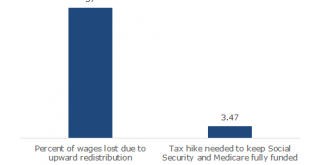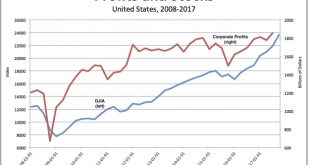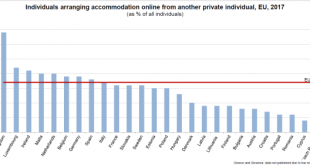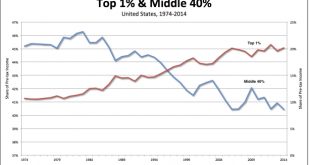from Dean Baker With the Republicans having just passed a $1.5 trillion tax cut, the bulk of which goes to the richest one percent, it was inevitable that the generational warriors would come out of the woodwork and resume the attack on Social Security and Medicare. Generational warriors try to divert attention away from how our economy has redistributed income upwards over the last four decades, and convince a large portion of today’s workers that their real problems stem from their...
Read More »It’s the profits, stupid!
from David Ruccio There’s no real mystery behind the spectacular gains in the stock market over the course of 2017. Much of it can be explained by the rise in U.S. corporate profits. But, as is clear from the chart above, the relationship between corporate profits (after tax, in red, measured on the right-hand side) and the stock market (the Dow Jones Industrial Index, in blue on the left) actually goes back almost a decade. Corporate profits have increased, from their low in the fourth...
Read More »Krugman’s misapplication of neoclassical growth models
from Lars Syll The fallacies loanable funds theory commits might be explainable by the misapplication of some ideas and concepts of neoclassical growth models … to the sphere of money and finance … The Ramsey and Solow models are models of real investment only. Financial markets, financial assets and financial saving do not play any role in those models. There is only one good which, for simplicity, will be called “corn”. Corn has three functions: it can be consumed, invested and used...
Read More »Body parts—from gifts to exchanges
from David Ruccio Over the course of the last two days, I’ve discussed mean gifts (which promise significant tax relief only to a small group of corporations and wealthy individuals) and mean exchanges (which leave middle-class Americans with a declining share of national income). Now, thanks to recently completed Reuters investigation, we’re forced to confront the reality in the United States of mean exchanges that transform generous donations into desperate, mean gifts. I’m referring to...
Read More »Thoughts about the sharing economy
Recently, Eurostat published data on the sharing economy. Its huge (graph, source: Eurostat). And this digital enhanced sharing economy should be (and is) included in GDP. But the private, non-monetary use of digital GPS apps which enhance your life as they enable you to find your way when, after attending a wedding, you get lost in rural Kent, 2:00 AM (happens…): not. There is a discussion going on if GDP tracks the changes in our life caused by the use of all kind of digital gadgets. It...
Read More »Is it time to ditch the natural rate hypothesis?
from Lars Syll Fifty years ago Milton Friedman wrote an (in)famous article arguing that (1) the natural rate of unemployment was independent of monetary policy, and (2) trying to keep the unemployment rate below the natural rate would only give rise to higher and higher inflation. The hypothesis has always been controversial, and much theoretical and empirical work has questioned the real-world relevance of the ideas that unemployment really is independent of monetary policy and that...
Read More »1937
from Peter Radford Hayek says this: “The problem which we pretend [to] solve is how the spontaneous interaction of a number of people, each possessing only bits of knowledge, brings about a state of affairs in which prices correspond to costs, etc., and which could be brought about by deliberate direction only by somebody who possesses the combined knowledge of all those individuals … “ This is from his essay ‘Economics and Knowledge’ which was published in 1937. Hayek’s thrust is, of...
Read More »Resources for study of Polanyi’s Great Transformation
from Asad Zaman Summary: My 1000+ word summary of Polanyi’s classic: “The Great Transformation: The Political and Economic Origins of Our Times” has been wildly popular, remaining constantly among the top ten on the RWER Blog since it was was published nearly five years ago. I have recently (25/12/26) revised and updated the post to clean up extraneous elements and clarify the substance in light of readers comments as well as my own improved understanding. Perhaps the most important...
Read More »Mean exchanges
from David Ruccio Yesterday, I discussed the mean-spiritedness of the Republican tax cuts—which are being sold as a gift to the middle-class but, in reality, represent a massive transfer to a small group of large corporations and wealthy individuals. But, of course, the real violence associated with the tax-cut gift occurs before federal taxes are even levied, in the pre-tax distribution of income. As is clear from the chart above, since the mid-1970s, the share of income captured by...
Read More »Heretics and mainstream defenders
from Lars Syll Larry Elliott wrote a Guardian article the other day criticizing mainstream economics, arguing that we should stop treating economics as a science because it is nothing of the sort. A proper science involves testing a hypothesis against the available evidence. If the evidence doesn’t support the theory, a physicist or a biologist will discard the theory and try to come up one that does work empirically. Economics doesn’t work like that. Theories can be shown to work only by...
Read More » Real-World Economics Review
Real-World Economics Review








